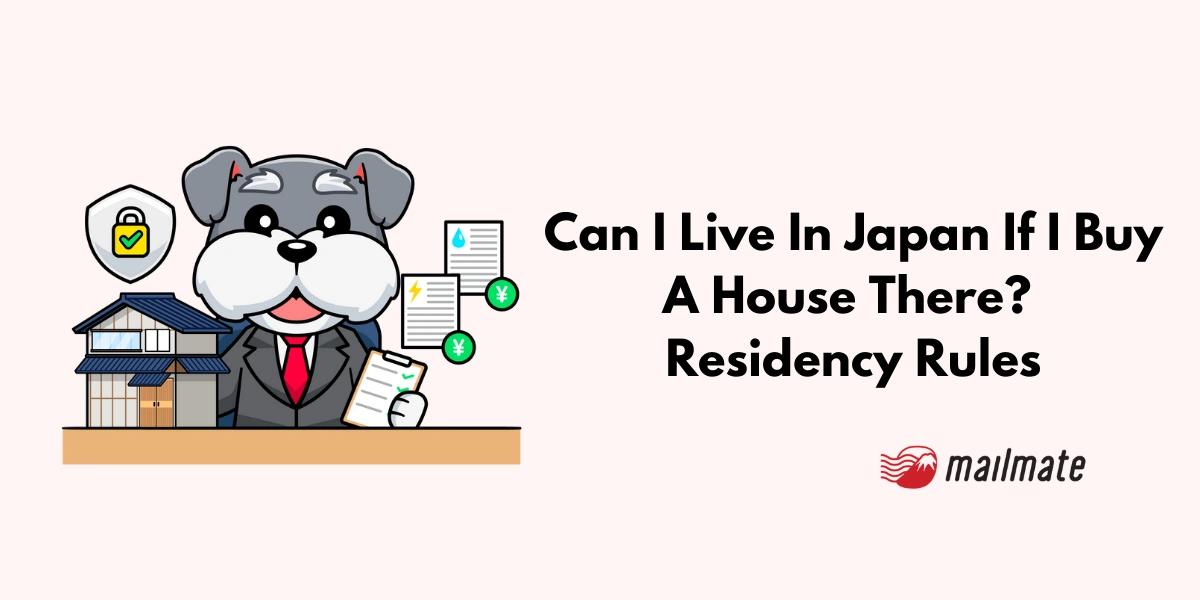Can I Live In Japan If I Buy A House There? Residency Rules

While anyone can buy real estate (land or akiya houses) in Japan, being an owner of Japanese real estate does not automatically grant residency rights.
If you plan to use your house in Japan as a vacation home, and only plan to stay there for a couple of weeks at a time, then a tourist visa will likely suffice.
However, if you would like to live in your house long-term, then you'll need to apply for one of Japan's visa types.
Here's what you need to know if you're thinking about buying and living in a house in Japan.
Can foreigners buy property in Japan?
First off, if you're considering buying a house in Japan, you’re in luck. Unlike some other countries that require some form of visa before purchasing property, foreigners abroad can buy Japanese real estate, and there are few legal restrictions when it comes to buying a house.
The following are a few minor cases in which foreigners are not allowed to purchase Japanese property:
Agricultural land: Japan's Agricultural Land Act places restrictions on the purchase of designated agricultural land by anyone (including Japanese citizens) who doesn't plan to farm it. As a foreigner, you'd need to obtain special permission from the local agricultural committee.
Forestry land: Similar to agricultural land, there can be special permissions required for forest lands.
Properties in certain strategic/military zones: Land near Self-Defense Force facilities, military bases, or other security-sensitive locations may have ownership restrictions.
Cultural heritage sites: Properties designated as cultural treasures or historical sites have restrictions for all buyers.
Some resort areas: Certain resort developments may have specific bylaws about foreign ownership, though this is uncommon.
In most cases, however, as long as you have enough money to afford the property, then you're all good.
Note: Financial institutions and Japanese banks may hesitate to give you a loan if you don't have a visa or other established ties to Japan. However, if your home bank has branches in Japan, that may be a good place to start.
How to stay in Japan when you own property there
Here are the Japanese visa options to consider if you want to live in your house in Japan:
1. Short-term visas
Short-term visas include tourist visas, allowing individuals to stay in Japan for a maximum of 90 days. With a short-term visa, it is possible to leave and reenter Japan for another 90 days.
However, a temporary tourist visa cannot exceed 180 days in a 12-month period. So, essentially, this visa limits you to a maximum of 6 months out of the year that you can spend on your Japanese property.
2. Long-term visas
Long-term visas are visas longer than 90 days and include the following visa types:
Visa Type |
Typical Duration(s) |
Renewal Available? |
Source |
Student Visa |
Up to 2 years |
Yes |
|
1 year, 3 years, or 5 years |
Yes |
||
6 months, 1 year, 3 years, or 5 years |
Yes |
||
Up to 5 years |
Yes |
||
3 months, 4 months, 1 year, 3 years, or 5 years |
Yes |
||
6 months |
No (must reapply after exit) |
With any of the above visa types, you will be able to stay at your property for the duration of your visa. We recommend consulting with an immigration lawyer for your unique situation.
3. Permanent resident status
Permanent residency in Japan (known as PR) allows foreigners to live and work in Japan without many restrictions and is valid for life.
Owning property in Japan does not guarantee permanent resident status. However, when applying for permanent residency, property ownership can serve as positive evidence of your commitment to Japan and financial stability, as it demonstrates ties to the country and investment in your future there.
How do you buy property in Japan?

Here are the essential steps to buying property in Japan.
Find a real estate company: Find a local real estate agent, preferably bilingual, to help you navigate the Japanese real estate market. Check out this article on English-speaking real estate companies that can help you with the home buying process.
Evaluate the property/arrange a viewing: Ensure that any renovations you desire are within your budget. Getting eyes on the property itself is a good way to make sure that you're getting something that you'll be able to handle in terms of purchase price and renovation costs.
Sign the sales agreement: Understand the terms, payment schedule, and contingencies.
Pay the deposit: As a standard in Japanese real estate, paying the deposit secures the land for you. The deposit is usually non-refundable.
Final payments and ownership transfer: The remaining balance will be paid over time, as set up by the sales agreement. You or a judicial scrivener must notify the local government that you own the land or property. After the government receives this notification, you will receive property taxes (see the next section) at your new Japanese residence.
Japanese banks might require a guarantor (a Japanese citizen or permanent resident) who will guarantee that any loans will be paid out. If not, you may be required to pay in full.
How to handle Japanese property taxes on your new property
When buying and owning a Japanese property, you’ll be required to pay a few key property-related taxes:
Real estate acquisition tax (不動産取得税, fudōsan shutoku zei)
Fixed asset tax (固定資産税, kotei shisan zei)
City planning tax (都市計画税, toshi keikaku zei)
These physical bills/tax premium notifications will be sent to the property in Japan that you have purchased.
If you do not plan to reside in Japan, then you must appoint a tax representative / domestic contact to handle your property taxes on your behalf.
Many foreign investors and property owners appoint MailMate as their tax representative, as MailMate provides the following services and more:
Receive and pay your property tax bills without a Japanese bank account.
Register MailMate as your Domestic Point of Contact at the time of your property purchase.
Receive your Japanese Mail digitally with English summaries & an interactive Mail Concierge.
Local point of contact and bill pay for your condo or building association.
Local point of contact for utility set-up and ongoing bill-pay.
Get fiber optic internet set-up at your property (inclusive of monthly internet fees)
When you make MailMate your tax representative, they’ll handle all that paperwork. So all you need to do is to click “Pay,” and just like that, your taxes are paid.
What taxes do foreigners pay if they own property but don’t live in Japan?
Owning property in Japan as a non-resident comes with specific tax obligations, even if you never live in the country.
1. Real estate acquisition tax (不動産取得税, fudōsan shutoku zei)
When it applies: Paid once after purchasing the property, usually within 6 months of acquisition.
Rate: Typically 4% of the property’s assessed value (can vary by prefecture).
Key point for foreigners: You are responsible for paying this tax regardless of residency. Many owners appoint a local tax representative to handle this.
2. Fixed asset tax (固定資産税, kotei shisan zei)
When it applies: Annually, based on the property’s assessed value.
Rate: Around 1.4% of the assessed value; some municipalities may add a small surcharge.
Resident vs. Non-Resident: Non-residents must designate a domestic point of contact to receive tax notifications.
3. City planning tax (都市計画税, toshi keikaku zei)
When it applies: Usually alongside fixed asset tax.
Rate: Up to 0.3% of the assessed value, depending on the city.
Special note: Applies to properties within designated urban planning areas.
4. Rental income tax (if you rent out your property)
Non-resident obligation: Rental income earned in Japan is taxable, even if you live abroad.
Rate: Flat 20.42% withholding tax on gross rental income for non-residents.
Recommendation: Consult a Japanese tax professional to file returns correctly and avoid double taxation with your home country.
Tip for non-residents: Hiring a tax representative in Japan ensures all property taxes are paid on time, notifications are received in English, and legal obligations are met without physically being in Japan.
Frequently asked questions
Can you get permanent residency in Japan if you buy a house?
No, you can not get PR in Japan if you buy a house.
Can a foreigner buy a house in Japan and live there?
While foreigners can buy a house in Japan, they can live there for a long time if they have a valid visa. Additionally, buying a house in Japan does not guarantee that you will obtain a visa.
Can you stay in Japan if you own property?
If you have property in Japan, you can stay if you have valid residency, such as a work visa or permanent residence.
Can I get a visa if I own property in Japan?
Owning property in Japan does not guarantee you a visa here. All visas in Japan are “activity-based,” meaning you must do something (studying, working, business management) to obtain a visa.
Where can a foreigner purchase property in Japan?
There are common real estate companies such as Suumo and Homes. However, akiya banks exist if you are looking for something more affordable. They are online vacant house and abandoned properties databases that anyone can view.
What are the available financing options for foreign buyers in Japan?
While cash purchases are common among foreign buyers in Japan, some specialized banks like Shinsei Bank, Prestia (SMBC Trust Bank), and Suruga Bank offer mortgage products specifically for non-residents. Expect higher interest rates (typically 2-3% higher than rates for residents) and larger down payments are usually required (30-50% versus 10-20% for residents). Additionally, loan terms may be shorter than those offered to residents.
What financial documents must I prepare for the loan application process?
Documentation requirements generally include proof of income (usually 2-3 years of tax returns), employment verification, credit history from your home country, passport and identification, and property value and details.
In closing
To summarize, buying property in Japan is not a guarantee for getting a visa in Japan. However, you do not need a Japanese visa to purchase property in Japan or to live on that property short term.
Double-check with a tax advisor or legal professional to understand any tax obligations or agreements between Japan and your home country regarding foreign-owned property.
Note: The Japanese government has various programs and subsidies to support home ownership in more countryside areas.
If you're looking for support for your real estate purchase journey, consider MailMate!
MailMate offers a tax agent service for real estate owners who have property in Japan but are living abroad.
The service includes the following features:
Tax representative for annual real estate tax payments
Domestic point of contact for authorities (required by law)
Bill pay support for property tax payments
Tax notifications with English summaries
A virtual mailbox to receive the mail that arrives at your Japanese property
Manage important property documents and notifications in one place
Other services MailMate offers include utility and Internet setup of your Japanese property.
Founded in 2019, MailMate has simplified property ownership for foreigners living abroad and is an increasingly popular option recommended by users as well as well-known industry figures.
Spending too long figuring out your Japanese mail?
Virtual mail + translation services start at 3800 per month. 30-day money-back guarantee.

